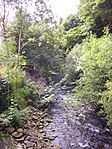South Wales Bible Training Institute
1919 establishments in Wales1937 disestablishments in WalesBible colleges, seminaries and theological colleges in WalesEducational institutions disestablished in 1937Educational institutions established in 1919 ... and 1 more
Further education colleges in Rhondda Cynon Taf
The South Wales Bible Training Institute was a Bible college in Porth. It was started by R. B. Jones in 1919. Classes were initially held in his church's vestry in Ynyshir, but later moved to Tynycymmer Hall in Porth. It was inspired by American fundamentalist Bible schools, especially Moody Bible Institute. It closed in 1937.South Wales Bible Training Institute trained men and women in Bible knowledge "for all kinds of Christian work at home and abroad." Densil D. Morgan has called it and the Bible College of Wales "Welsh fundamentalism's two most visible inter-war manifestations".
Excerpt from the Wikipedia article South Wales Bible Training Institute (License: CC BY-SA 3.0, Authors).South Wales Bible Training Institute
Tynycymmer Close,
Geographical coordinates (GPS) Address Nearby Places Show on map
Geographical coordinates (GPS)
| Latitude | Longitude |
|---|---|
| N 51.613 ° | E -3.412 ° |
Address
Tynycymmer Close
Tynycymmer Close
CF39 9DE , Porth
Wales, United Kingdom
Open on Google Maps








